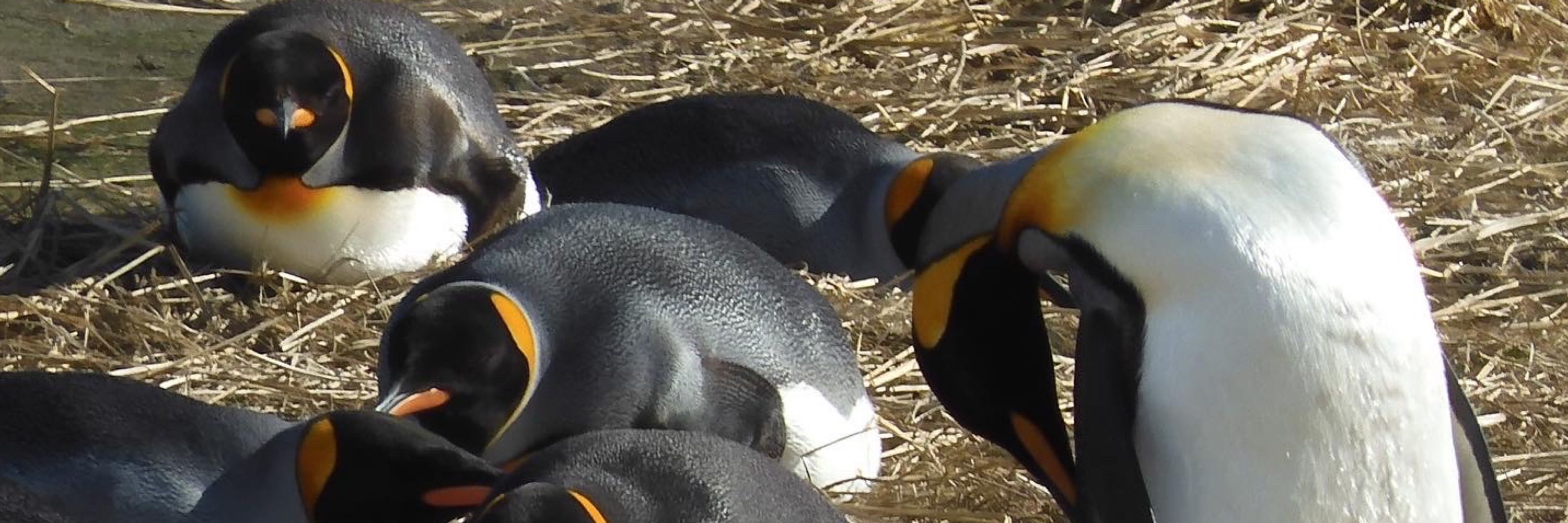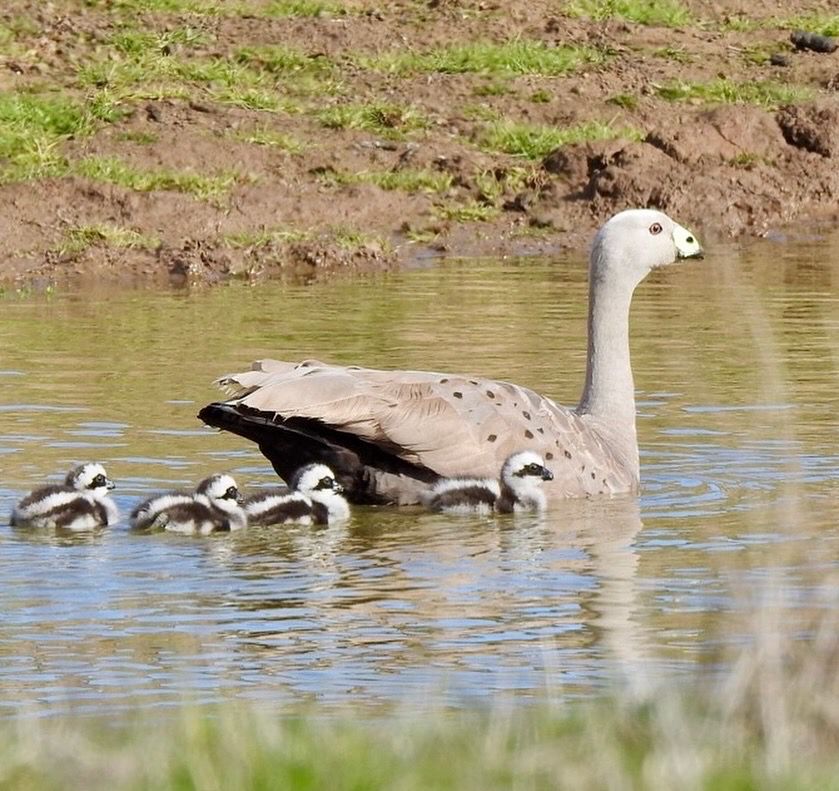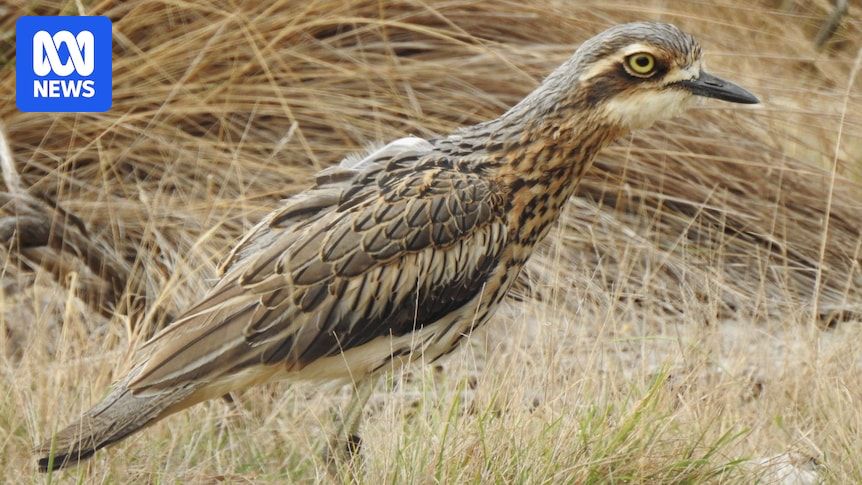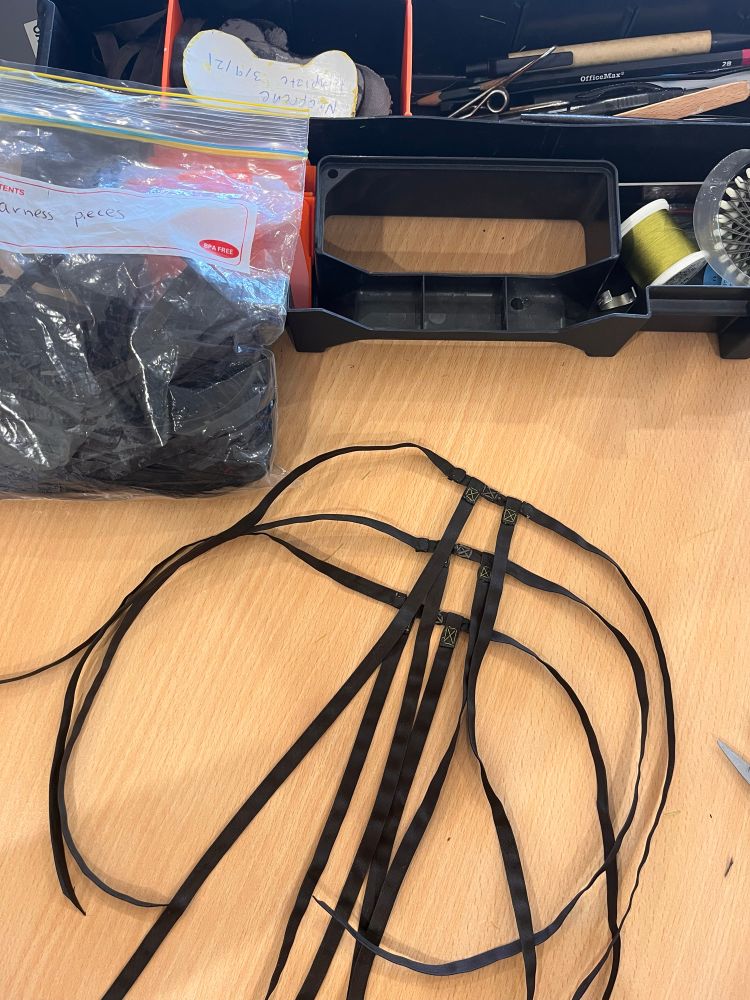
Paula Wasiak
@paulawasiak.bsky.social
Bringing weird birds back into the ‘burbs
Penguin field biologist turned PhD candidate
Reintroducing bush stone-curlews to Millowl
#SuperstarOfSTEM alumnus
Penguin field biologist turned PhD candidate
Reintroducing bush stone-curlews to Millowl
#SuperstarOfSTEM alumnus
Bush stone-curlews, but with a Mean Girls flair.
October 29, 2025 at 3:52 AM
Bush stone-curlews, but with a Mean Girls flair.
Our April cohort of birds have officially graduated the close monitoring phase!
Having completed 6-months of living their best wild lives means that I’ll now be mostly hands off (except for following their movements via their GPS backpacks like the creep that I am)
Thrive, birdies, thrive!
Having completed 6-months of living their best wild lives means that I’ll now be mostly hands off (except for following their movements via their GPS backpacks like the creep that I am)
Thrive, birdies, thrive!

October 14, 2025 at 7:45 AM
Our April cohort of birds have officially graduated the close monitoring phase!
Having completed 6-months of living their best wild lives means that I’ll now be mostly hands off (except for following their movements via their GPS backpacks like the creep that I am)
Thrive, birdies, thrive!
Having completed 6-months of living their best wild lives means that I’ll now be mostly hands off (except for following their movements via their GPS backpacks like the creep that I am)
Thrive, birdies, thrive!
While adoption in geese (& waterfowl in general) is well known, never have I seen such an age difference!
If you look closely, you’ll see two very young cape barren goslings amongst four much older ones.
I’ve been watching this family all week and they certainly appear to be in harmony.
If you look closely, you’ll see two very young cape barren goslings amongst four much older ones.
I’ve been watching this family all week and they certainly appear to be in harmony.

September 25, 2025 at 10:50 PM
While adoption in geese (& waterfowl in general) is well known, never have I seen such an age difference!
If you look closely, you’ll see two very young cape barren goslings amongst four much older ones.
I’ve been watching this family all week and they certainly appear to be in harmony.
If you look closely, you’ll see two very young cape barren goslings amongst four much older ones.
I’ve been watching this family all week and they certainly appear to be in harmony.
All geared up and ready to go. The past two weeks have been busy getting more bush stone-curlews ready for release on Milawul, Phillip Island.

September 23, 2025 at 8:11 AM
All geared up and ready to go. The past two weeks have been busy getting more bush stone-curlews ready for release on Milawul, Phillip Island.
Here’s a superb fairy-wren living up to his name and looking superb.
My days are currently being spent between appointments, tests, and slow walks in nature. I’m not mad about it.
My days are currently being spent between appointments, tests, and slow walks in nature. I’m not mad about it.

August 18, 2025 at 6:58 AM
Here’s a superb fairy-wren living up to his name and looking superb.
My days are currently being spent between appointments, tests, and slow walks in nature. I’m not mad about it.
My days are currently being spent between appointments, tests, and slow walks in nature. I’m not mad about it.
Within an hour of getting off the nest, these cape barren goslings were already getting some important goose lessons.
Once (still?) considered one of the rarest geese in the world, Milawul, with its fox-free status, is now a population stronghold for the species.
Once (still?) considered one of the rarest geese in the world, Milawul, with its fox-free status, is now a population stronghold for the species.

August 7, 2025 at 11:14 PM
Within an hour of getting off the nest, these cape barren goslings were already getting some important goose lessons.
Once (still?) considered one of the rarest geese in the world, Milawul, with its fox-free status, is now a population stronghold for the species.
Once (still?) considered one of the rarest geese in the world, Milawul, with its fox-free status, is now a population stronghold for the species.
Had the pleasure chatting with one of my favourite humans today, but this time on the stage! I love Dr Ann beyond measure. Especially when she reveals, in great detail, how alpacas copulate.


July 26, 2025 at 9:10 AM
Had the pleasure chatting with one of my favourite humans today, but this time on the stage! I love Dr Ann beyond measure. Especially when she reveals, in great detail, how alpacas copulate.
Alison and her family have been such wonderful champions of the reintroduction program. On some nights, up to five birds visit their property and run laps around their home - and they love it! (And no, the birds don’t keep them awake - they’ve never heard a peep!)
www.abc.net.au/news/2025-07...
www.abc.net.au/news/2025-07...

Curlews return to fox-free Phillip Island, 40 years after last sighting
Decades after the bush stone-curlew went extinct on Phillip Island, scientists reintroduce the species and hope the eradication of foxes will enable the flock to grow in the wild again.
www.abc.net.au
July 22, 2025 at 10:50 PM
Alison and her family have been such wonderful champions of the reintroduction program. On some nights, up to five birds visit their property and run laps around their home - and they love it! (And no, the birds don’t keep them awake - they’ve never heard a peep!)
www.abc.net.au/news/2025-07...
www.abc.net.au/news/2025-07...
Officially completed the first year of my PhD 🎉 it sure has been a whirlwind with two translocations done and more data than you can poke a stick at.
Today is also 4 weeks until I undergo surgery for thyroid cancer 🫠
You win some, you lose some.
Here’s a cake I gifted my GP today.
Today is also 4 weeks until I undergo surgery for thyroid cancer 🫠
You win some, you lose some.
Here’s a cake I gifted my GP today.

July 1, 2025 at 6:57 AM
Officially completed the first year of my PhD 🎉 it sure has been a whirlwind with two translocations done and more data than you can poke a stick at.
Today is also 4 weeks until I undergo surgery for thyroid cancer 🫠
You win some, you lose some.
Here’s a cake I gifted my GP today.
Today is also 4 weeks until I undergo surgery for thyroid cancer 🫠
You win some, you lose some.
Here’s a cake I gifted my GP today.
Hi friends! Tomorrow I’ll be chatting at #ICCB2025 about our bush stone-curlew pilot release on Milawul, Phillip Island. Hope to see you there!

June 15, 2025 at 5:40 AM
Hi friends! Tomorrow I’ll be chatting at #ICCB2025 about our bush stone-curlew pilot release on Milawul, Phillip Island. Hope to see you there!
Welcome back, flame robins!
Each year I struggle with the colder weather, and I like to look for the things that spark joy- like the whales that migrate past my local beach, the cape barren geese breeding, and the flame robins that come down from the high country.
Each year I struggle with the colder weather, and I like to look for the things that spark joy- like the whales that migrate past my local beach, the cape barren geese breeding, and the flame robins that come down from the high country.

May 9, 2025 at 9:07 PM
Welcome back, flame robins!
Each year I struggle with the colder weather, and I like to look for the things that spark joy- like the whales that migrate past my local beach, the cape barren geese breeding, and the flame robins that come down from the high country.
Each year I struggle with the colder weather, and I like to look for the things that spark joy- like the whales that migrate past my local beach, the cape barren geese breeding, and the flame robins that come down from the high country.
Reposted by Paula Wasiak
The @coexistconservlab.bsky.social is bringing the bush stone-curlew back to the wild in SE Australia.
“If successful, the reintroduction will demonstrate how we can work together to recover species from extinction and return them to their natural ecological roles across south-eastern Australia.”
“If successful, the reintroduction will demonstrate how we can work together to recover species from extinction and return them to their natural ecological roles across south-eastern Australia.”

Birds with backpacks released on Phillip Island
Twenty-four bush stone-curlews will be reintroduced to the wild on Phillip Island to help the species regain a foothold in Victoria, where it is critically endangered.
fennerschool.anu.edu.au
April 14, 2025 at 3:02 AM
The @coexistconservlab.bsky.social is bringing the bush stone-curlew back to the wild in SE Australia.
“If successful, the reintroduction will demonstrate how we can work together to recover species from extinction and return them to their natural ecological roles across south-eastern Australia.”
“If successful, the reintroduction will demonstrate how we can work together to recover species from extinction and return them to their natural ecological roles across south-eastern Australia.”
Another 24 bush stone-curlews have now been released on Milawul, Phillip Island, in an effort to establish a population here.
With over thirty birds on the island, it’s likely the largest bush stone-curlew population in the state.
With over thirty birds on the island, it’s likely the largest bush stone-curlew population in the state.

April 12, 2025 at 4:16 AM
Another 24 bush stone-curlews have now been released on Milawul, Phillip Island, in an effort to establish a population here.
With over thirty birds on the island, it’s likely the largest bush stone-curlew population in the state.
With over thirty birds on the island, it’s likely the largest bush stone-curlew population in the state.
Huge news!
Our pilot reintroduction of bush stone-curlews on Phillip Island has been a success, with a 75% survival rate over 7-months post-release.
This week, we’re moving onto the next phase and attempting to establish a population.
Our pilot reintroduction of bush stone-curlews on Phillip Island has been a success, with a 75% survival rate over 7-months post-release.
This week, we’re moving onto the next phase and attempting to establish a population.
April 9, 2025 at 9:55 PM
Huge news!
Our pilot reintroduction of bush stone-curlews on Phillip Island has been a success, with a 75% survival rate over 7-months post-release.
This week, we’re moving onto the next phase and attempting to establish a population.
Our pilot reintroduction of bush stone-curlews on Phillip Island has been a success, with a 75% survival rate over 7-months post-release.
This week, we’re moving onto the next phase and attempting to establish a population.
One does not spend 40+ hours sewing GPS backpack harnesses for birds without making a silly video about it.
April 3, 2025 at 5:55 AM
One does not spend 40+ hours sewing GPS backpack harnesses for birds without making a silly video about it.
There are seven bush stone-curlews in this photo.
Their decline in southern Australia is due to ⬇️ roosting habitat and ⬆️ in predation by invasive predators.
This photo shows just how important daytime roosts are to avoid predation - overstory to hide under & woody debris to camouflage amongst.
Their decline in southern Australia is due to ⬇️ roosting habitat and ⬆️ in predation by invasive predators.
This photo shows just how important daytime roosts are to avoid predation - overstory to hide under & woody debris to camouflage amongst.

March 25, 2025 at 4:31 AM
There are seven bush stone-curlews in this photo.
Their decline in southern Australia is due to ⬇️ roosting habitat and ⬆️ in predation by invasive predators.
This photo shows just how important daytime roosts are to avoid predation - overstory to hide under & woody debris to camouflage amongst.
Their decline in southern Australia is due to ⬇️ roosting habitat and ⬆️ in predation by invasive predators.
This photo shows just how important daytime roosts are to avoid predation - overstory to hide under & woody debris to camouflage amongst.
✔️ 3x GPS harnesses created (it took the entire work day).
15 to go.
15 to go.

March 24, 2025 at 7:39 AM
✔️ 3x GPS harnesses created (it took the entire work day).
15 to go.
15 to go.
A busy but successful week preparing for our next bush stone-curlew release.
This time I’m trialling a few different treatment groups with the aim of increasing translocation success 🤞🤞
This time I’m trialling a few different treatment groups with the aim of increasing translocation success 🤞🤞

March 6, 2025 at 10:29 PM
A busy but successful week preparing for our next bush stone-curlew release.
This time I’m trialling a few different treatment groups with the aim of increasing translocation success 🤞🤞
This time I’m trialling a few different treatment groups with the aim of increasing translocation success 🤞🤞
Here’s a southern brush-tailed rock-wallaby up in a tree.
March 4, 2025 at 12:44 AM
Here’s a southern brush-tailed rock-wallaby up in a tree.
There’s definitely no bush stone-curlew in this image.

March 1, 2025 at 8:26 AM
There’s definitely no bush stone-curlew in this image.
Come and follow my wonderful lab ⬇️
Welcome to the Coexistence Conservation Lab! 🌿
We're a lab group at ANU researching conservation in the context of rewilding, genetics, translocations, and species coexistence. We aim to understand and restore ecosystems, prioritising species that shape landscapes and promote biodiversity.
We're a lab group at ANU researching conservation in the context of rewilding, genetics, translocations, and species coexistence. We aim to understand and restore ecosystems, prioritising species that shape landscapes and promote biodiversity.

February 21, 2025 at 7:25 AM
Come and follow my wonderful lab ⬇️
Art, bush stone-curlew style.

February 19, 2025 at 9:50 AM
Art, bush stone-curlew style.
Happy Saturday.
Here’s a lovely little sacred kingfisher.
Here’s a lovely little sacred kingfisher.

February 15, 2025 at 6:29 AM
Happy Saturday.
Here’s a lovely little sacred kingfisher.
Here’s a lovely little sacred kingfisher.
What happens to snakes when they get relocated?
Some very ingesting research from ANU PhD candidate, Hannah Gerke, showing translocated snakes lose significant weight and body condition.
Here’s an ABC article that summarises the work.
www.abc.net.au/news/2025-02...
Some very ingesting research from ANU PhD candidate, Hannah Gerke, showing translocated snakes lose significant weight and body condition.
Here’s an ABC article that summarises the work.
www.abc.net.au/news/2025-02...

Snakes become 'very disoriented', lose weight and get sick when relocated
Hundreds of snakes are moved from backyards, inside homes and other urban areas into reserves and bushland around Canberra each year — but until now, little has been known about what happens to snakes...
www.abc.net.au
February 9, 2025 at 8:56 PM
What happens to snakes when they get relocated?
Some very ingesting research from ANU PhD candidate, Hannah Gerke, showing translocated snakes lose significant weight and body condition.
Here’s an ABC article that summarises the work.
www.abc.net.au/news/2025-02...
Some very ingesting research from ANU PhD candidate, Hannah Gerke, showing translocated snakes lose significant weight and body condition.
Here’s an ABC article that summarises the work.
www.abc.net.au/news/2025-02...
All those spots in the sky? They’re short-tailed shearwaters returning to feed their chicks.
The adults fly all the way to Antarctic waters to forage, before returning to feed their chicks - a trip that can take two week! Which, for these transequatorial migrators, is probably no big deal for them
The adults fly all the way to Antarctic waters to forage, before returning to feed their chicks - a trip that can take two week! Which, for these transequatorial migrators, is probably no big deal for them

February 3, 2025 at 10:18 PM
All those spots in the sky? They’re short-tailed shearwaters returning to feed their chicks.
The adults fly all the way to Antarctic waters to forage, before returning to feed their chicks - a trip that can take two week! Which, for these transequatorial migrators, is probably no big deal for them
The adults fly all the way to Antarctic waters to forage, before returning to feed their chicks - a trip that can take two week! Which, for these transequatorial migrators, is probably no big deal for them

